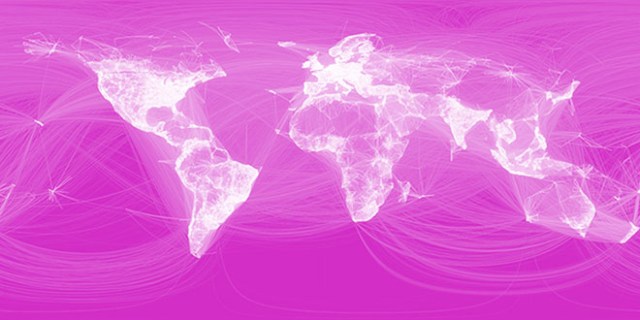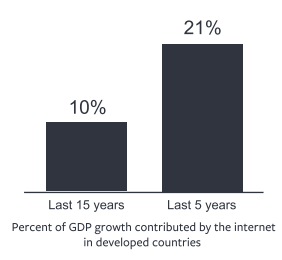
Facebook has just announced a partnership with Samsung, Ericsson, MediaTek, Nokia, Opera and Qualcomm to launch Internet.org, a project aimed at bringing affordable Internet access to the 5 billion people without it. The companies will work together on data-compression technologies and cheap, high-quality smartphones to make the web cheaper.
While it might seem like the whole world is connected, just one-third of the globe’s population has Internet access, and adoption is only growing at 9 percent. Internet.org aims to speed up that rate.
Zuckerberg writes “There are huge barriers in developing countries to connecting and joining the knowledge economy. Internet.org brings together a global partnership that will work to overcome these challenges, including making internet access available to those who cannot currently afford it.” Zuckerberg has laid out his thoughts on accessibility in a paper called “Is Connectivity A Human Right?“

The three major initiatives of the partnership are:
Making access affordable through cheaper smartphones, and working with mobile operators to extend Internet access to underserved communities.
Using data more efficiently so people don’t run up high costs. Internet.org partners may look to build data-compression tools, bolster network efficiency, and improve data caching.
Helping businesses drive access to grow mobile businesses sustainably. Partners will aim to create mutually beneficial incentives for app developers, device OEMs, and operators that will get more people online. The companies will also work together to help mobile devices support more languages to demolish barriers to usage.
The push is rooted in altruism and global community, but may eventually serve to boost the businesses of all mobile companies. By enlarging the pie — getting more people online — everyone in the mobile business could benefit. That includes Facebook and the device manufacturers spearheading this project, but also the carriers, app developers, e-commerce companies, advertisers, and even artists who distribute their work via mobile.
Google has long been a pioneer in accessibility projects. Its latest, Project Loon, aims to bring Internet to disconnected community by beaming them a 3G signal from giant balloons. In the past Google has offered free Gmail access over SMS in Africa, while Twitter has worked with international carriers to let people tweet without paying for data.
Zuckerberg says Facebook has invested $1 billion into accessibility initiatives over the last few years, though they’ve mostly focused on connecting people to its own service. The Facebook Zero program provides free access to a stripped-down feature phone version of the social network through carriers in the developing world. The idea is that if Facebook can get low-tech mobile users hooked early, they’ll stick with it and stay connected to their social graph as they move on to smartphones.

ZUCK SAYS CONNECTIVITY IS A HUMAN RIGHT
Cynics will assume Facebook wants to promote accessibility for one reason: eyeballs to advertise to. But whether or not you believe it, Facebook is truly trying to achieve its mission of connecting the world. There might be positive business side effects to that, but they’re not the driving force.
In fact, Facebook admits that helping businesses, including itself, is one of the three core components of Internet.org. That way this can be a sustainable initiative, not just some temporary flag waving.
In his whitepaper, Zuckerberg explains:
“I’m focused on this because I believe it is one of the greatest challenges of our generation. The unfair economic reality is that those already on Facebook have way more money than the rest of the world combined, so it may not actually be profitable for us to serve the next few billion people for a very long time, if ever. But we believe everyone deserves to be connected.”
 Zuckerberg goes on to note that, while everyone might soon have a smartphone, much of the world can’t afford data access. “There is no guarantee that most people will ever have access to the internet. It isn’t going to happen by itself. But I believe connectivity is a human right.”
Zuckerberg goes on to note that, while everyone might soon have a smartphone, much of the world can’t afford data access. “There is no guarantee that most people will ever have access to the internet. It isn’t going to happen by itself. But I believe connectivity is a human right.”
It’s also good for the world economy. Zuckerberg cites a McKinsey study illustrating that the Internet accounts for 21 percent of GDP growth in developed nations over the last five years, and only one job is lost for every 2.6 jobs created by the Internet. “The knowledge economy is the future,” he writes, echoing the logic behind his founding immigration reform group FWD.us.
In his road map for accessibility, Zuckerberg says that data access needs to be roughly 100x cheaper for companies to be able to offer basic, text-based services, such as search, messaging, social networking, and knowledge bases for free. Steps toward this goal include:
- Increasing efficiency of mobile networks, data centers, data transmission, and spectrum allocation
- Reducing the amount of data apps have to pull from networks through caching, compression, and futuristic technologies like peer-to-peer data transfer
- Making investments in accessibility profitable by educating people about the uses of data, creating business models that thrive when free data access is offered initially, and building out credit card infrastructure so carriers can move from pre-paid to post-paid models that facilitate investment
If the plan works, mobile operators will gain more customers and invest more in accessibility; phone makers will see people wanting better devices; Internet providers will get to connect more people; and people will receive affordable Internet so they can join the knowledge economy and connect with the people they care about.
Zuckerberg concludes his paper saying “I think that connecting the world will be one of the most important things we all do in our lifetimes, and I’m thankful every day to have the opportunity to work with all of you to make this a reality.”
Nestled in the highly wired Bay Area, Facebook’s team members have felt the joy of growing closer to their friends and family through the Internet. Many of us have, too, but it’s bittersweet knowing there are people who can’t afford that opportunity. Internet.org could help share the experience of connection with the whole planet.



0 comments:
Post a Comment